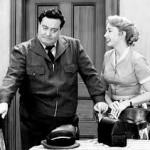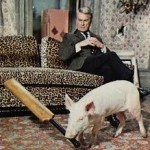Bizarrely, live-action television has rarely been a particularly fertile venue for surrealism.
 This is very odd indeed, for the very premise of most historical (and many contemporary) sitcoms could not be more surreal: people pretend to act like a “real” family or “real” friends, except they do it in front of an audience in a three wall format, and everything is neatly sewn up in 22 minutes. The standard sitcom modus operandi has, literally, zero to do with reality, and only its greatest masters (like Jackie Gleason and The Honeymooners) can eke any true realism out of such an impossibly unrealistic format. Think, for a moment: does a minute of any episode of I Love Lucy or The Brady Bunch actually resembles even a chalk-outline of real life?
This is very odd indeed, for the very premise of most historical (and many contemporary) sitcoms could not be more surreal: people pretend to act like a “real” family or “real” friends, except they do it in front of an audience in a three wall format, and everything is neatly sewn up in 22 minutes. The standard sitcom modus operandi has, literally, zero to do with reality, and only its greatest masters (like Jackie Gleason and The Honeymooners) can eke any true realism out of such an impossibly unrealistic format. Think, for a moment: does a minute of any episode of I Love Lucy or The Brady Bunch actually resembles even a chalk-outline of real life?
So why not take it further? Why do sitcoms insist on building the same old imitation reality over and over again? Why not try something genuinely different?
For generations, television comedy has been locked into two fairly unyielding formats: the “domestic” or workplace sitcom where actors perform situational set-ups and jokes in three-walled setting, and the “review” format, where limited-time sketches are performed in the same three-wall setting (although Saturday Night Live has long boasted that there’s a big difference between them and the sketches of The Carol Burnett Show, it’s essentially all the same stuff, just with a few risqué concepts added). Admittedly, there has been a little bit of healthy re-orientation in the last two decades, thanks to the introduction of the single-camera/no-live audience (or laugh-track) sitcoms pioneered by Ricky Gervais and Gary Shandling.
 I am sure there are a few others, but only Green Acres stands out as a sitcom that utilized the absurdity inherent in the traditional sitcom format to explore completely non-realistic premises for comic effect (and, of course, I will note the insertion of the alien Mork into Happy Days, one of the world’s most unrealistic sitcoms). I also think the often wonderful Scrubs got very close to finding a workable method for injecting surrealism into sitcoms (by the way, I am isolating the consistent use of absurd elements – like Green Acres’ sentient pig – from the bizarre trend in the ‘60s to take absurd premises and treat them as ordinary, like in The Flying Nun, My Mother The Car, Mr. Ed).
I am sure there are a few others, but only Green Acres stands out as a sitcom that utilized the absurdity inherent in the traditional sitcom format to explore completely non-realistic premises for comic effect (and, of course, I will note the insertion of the alien Mork into Happy Days, one of the world’s most unrealistic sitcoms). I also think the often wonderful Scrubs got very close to finding a workable method for injecting surrealism into sitcoms (by the way, I am isolating the consistent use of absurd elements – like Green Acres’ sentient pig – from the bizarre trend in the ‘60s to take absurd premises and treat them as ordinary, like in The Flying Nun, My Mother The Car, Mr. Ed).
All of this is to underline what a startling, original delight Noel Fielding’s Luxury Comedy is. Luxury Comedy has recently started its’ second season on British television (it had a six-episode debut season in 2012; it would be largely pointless and almost certainly confusing to attempt to explain how the British model of television seasons and series renewals has virtually nothing to do with the American concept, so let’s just not go there, okay?). One barely knows where to start in attempting to explain what Luxury Comedy is; it would be effective to say that what Fielding does in a live-action show is closer – far closer – to animated shows like Sponge Bob Square Pants, Superjail, or the marvelous Adventure Time. There is a relatively steady “situation” – in series 2, it involves Fielding (using his real name) and his gang operating a coffee shop situated on the rim of a Hawaiian Volcano. Oh, I should mention that Fielding’s cohorts include Andy Warhol, a human/anteater hybrid, and a mod, snarky German woman. Other regular characters and visitors include a New York cop who drives a cardboard car and whose partner is embedded in his shoulder, a talking Hammerhead Shark who is an experienced recording engineer, Don Quixote, and Joey Ramone (who is just a silent, armless clay figure).
Fielding, of course, was one-half of The Mighty Boosh, the utterly brilliant comedy team whose television show (2004 – 2007) is quite literally one of the ten funniest television shows ever made. Luxury Comedy takes as a starting point the Boosh’s more psychedelic visual elements and more bizarre character factors; Fielding then spins these off into their own self-dependent world. LuxCom is like an un-tethered balloon released by the Boosh, where the Dada/Dali/Duchamp Happy-Acid-Trip implied by much of the Boosh’s work is left to simmer into a surrealistic gumbo of nonsense that utterly refuses to walk the fine-line between the intellectual and the childish; rather, Fielding’s new show has one foot firmly in both, which is why watching even two minutes of LuxCom will make you think of Antonin Artaud, James Joyce, Thomas Pynchon, William Burroughs, and Samuel Beckett getting together to rewrite a four-year old’s story of the dinosaur living in their closet. Seriously, it’s a lot like that.
 In its ability to channel surrealism via live action and its’ attempt (only sometime successful, but always riveting) to make live-action comedy that is completely detached from reality (even as it makes a bare effort to adhere to a consistent premise), Noel Fielding’s Luxury Comedy is the successor to The Goon Show, the British radio show which literally invented modern British humor.
In its ability to channel surrealism via live action and its’ attempt (only sometime successful, but always riveting) to make live-action comedy that is completely detached from reality (even as it makes a bare effort to adhere to a consistent premise), Noel Fielding’s Luxury Comedy is the successor to The Goon Show, the British radio show which literally invented modern British humor.  The Goons, who were on the air from 1951 to 1960, abandoned traditional storytelling and replaced it with illogical absurdity that took advantage of the idea that in one-dimensional radio-land, nonsense made as much sense as bad imitations of reality; the Goons also pretty much invented the idea that a non-sequitur could replace a punchline. I’ll write about the Goons at greater depth in the near future (they are one of the most important cultural forces of the 20th Century), but very, very rarely has their innovations been utilized in setting-based live action comedy, which is what makes Luxury Comedy so very, very exciting.
The Goons, who were on the air from 1951 to 1960, abandoned traditional storytelling and replaced it with illogical absurdity that took advantage of the idea that in one-dimensional radio-land, nonsense made as much sense as bad imitations of reality; the Goons also pretty much invented the idea that a non-sequitur could replace a punchline. I’ll write about the Goons at greater depth in the near future (they are one of the most important cultural forces of the 20th Century), but very, very rarely has their innovations been utilized in setting-based live action comedy, which is what makes Luxury Comedy so very, very exciting.
Recently, drama on television has taken enormous leaps; following the pioneering lead of Six Feet Under, shows like House of Cards, Hannibal, Breaking Bad, American Horror Story, and many others are, for the very first time, consistently bringing cinema-quality events into the living rooms of America. It’s now time for live-action comedy to play catch-up, to move on from the done-to-death innovations of Office-type mock-docs and realize the rather stunning potential the medium has for capturing, exploring, and exploiting entertaining surrealism. Go ahead; stop putting a bunch of people in an apartment or an office and writing jokes about their relationships and their jobs and what’s in their refrigerator. Instead, I challenge you to go all Duchamp and do the equivalent of sticking a urinal on the wall (or as Luxury Comedy does, have a regular character who Wikipedia, in it’s best dry fashion, describes as “an anthropomorphic chocolate finger biscuit who works as a PE teacher and once served in the army. He suffers from post-traumatic stress disorder and often talks about how depressed he is because his wife passed away”). I hope Luxury Comedy is a harbinger of the future; in the meantime, it’s just a gorgeous, original, psychedelic delight, a brave attempt to bring the beautiful non-logic of animation to the world of live-action.
